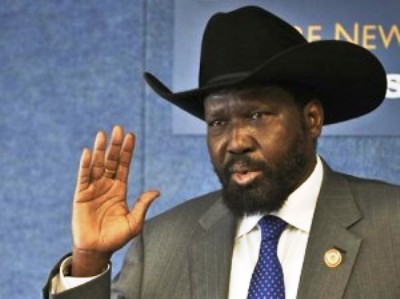Kiir revokes dismissal order of party leadership as rebels hail decision
February 25, 2015 (JUBA/ADDIS ABABA) – South Sudanese president Salva Kiir, who doubles as the ruling party’s (SPLM) chairman, has issued executive orders cancelling a previous order dismissing senior party members, marking the beginning of implementation of the reunification deal.

In the order, Kiir also expresses a readiness to resolve the current conflict and directs his negotiating team in the Ethiopian capital, Addis Ababa, to expedite the process for a lasting peace agreement so as to restore stability.
Some analysts say the president’s latest move will allow for the return of former political detainees led by former SPLM secretary-general Pagan Amum, who were released to Nairobi.
Under the roadmap deal returning officials will be allowed to reclaim their assets in the country and access their bank accounts.
It also outlines security arrangements for the nine representatives of the three factions, comprising three of each from the opposition, South Sudanese government and former political detainees.
The representatives of the three factions, are due to meet in Juba in 45 days’ time to discuss reformation within the party leadership.
The Arusha deal, if implemented in its entirety, allows for the reunification of the three factions and reappoints Machar to his previous party position as the first deputy chairperson, placing him directly next to Salva Kiir, according to the hierarchical and structural arrangements of the leadership of the party.
What remains unclear is whether Juba would now agree to the leadership proposal by the Intergovernmental Authority on Development (IGAD) to make Machar president Kiir’s vice president to replace the incumbent James Wani Igga in the government in accordance with the party’s seniority.
The order was issued following Kiir’s recent visit to Nairobi, where he held a meeting with former detainees before Kenyan president Uhuru Kenyatta.
Kiir travelled to Nairobi on 20 February, returning to the nation’s capital, Juba, the following day after which he held a meeting with incumbent vice-president James Wani Igga and acting secretary Ann Itto to discuss the outcome of the Nairobi meeting.
Daniel Awet Akot, a leading member of the ruling party, expressed his gratitude to the president for his willingness to open a new political page and effect the implementation of the Arusha deal.
REBELS WELCOME DECISION
Meanwhile, Machar’s SPLM in Opposition faction has welcomed the presidential order revoking his decision to dismiss party colleagues, saying it was a positive step forward in a process that aimed to achieve peace and reconciliation in the country.
“The leadership of SPLM/SPLA [in Opposition] welcomes revocation of the previous unilateral decision by Salva Kiir which unnecessarily dismissed party leaders. This is a positive step in accordance with a provision in the Arusha roadmap agreement on reunification,” said Machar’s spokesman, James Gatdet Dak.
However, Dak has dismissed as “premature” rumours that leaders of the opposition group, including Machar, would return to Juba within 45 days as per the initial Arusha intra-party deal, saying this was attached to a final peace agreement in Addis Ababa.
“No, this is simply a guiding roadmap for further discussions and agreement. Many other core issues highlighted in the roadmap deal such as reforms and party leadership are yet to be addressed,” he said.
According to Dak, full implementation of any future final Arusha agreement on reunification of the party would also depend on the signing of a lasting peace agreement in Addis Ababa.
Dak also declined to comment on behalf of the group of former detainees, whom he said might decide to rejoin the government based on the Arusha party roadmap agreement before a final peace agreement in Addis Ababa.
He clarified that the Arusha process only addressed issues pertaining to the crisis within the ruling party and that other outstanding issues aimed at resolving the country’s ongoing conflict, including issues of governance, political reforms, reconciliation, security arrangements, economic reforms, leadership structure and power-sharing arrangements, will be tackled through the IGAD-mediated peace process in Addis Ababa.
He accused the government of attempting to misrepresent the Arusha understanding and losing interest in the Addis Ababa peace process, saying this was indicative of Kiir’s “lack of commitment” as evidenced by his recent decision not to continue with direct negotiations with Machar on the major sticking points.
(ST)
